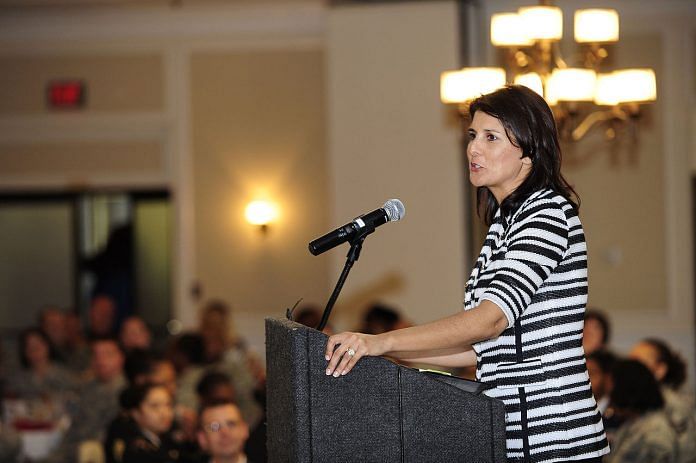THE ISOLATION OF QATAR
In the region’s most serious diplomatic crisis in years, Saudi Arabia, the United Arab Emirates, Egypt and Bahrain have broken off diplomatic relations and all land, sea, and air contact with fellow Gulf Arab state Qatar. Saudi Arabia said the move was necessary to protect the kingdom from terrorism and extremism.
Qatar has long faced criticism from its Arab neighbours over its support of Islamists. The chief worry among them is the Muslim Brotherhood, outlawed by both Saudi Arabia and the UAE. Western officials also have accused Qatar of allowing or even encouraging funding of Sunni extremists, like al-Qaeda’s branch in Syria.
Qatar’s air base is home to the US military’s central command, and some 10,000 American troops. It is unlikely that Saudi Arabia would have instigated this action against Qatar without first informing the US.
NIKKI HALEY PLAYS SMART POLITICS IN TRUMP ERA
Is Nikki Haley Trump administration’s lone human rights voice?
As US ambassador to the United Nations, Haley has taken positions on humanitarian issues that puts her at odds with the president. When Donald Trump told an audience of Muslim leaders last month that America will no longer “lecture” their countries on internal matters, it sent a clear signal that his administration plans to downplay human rights. But apparently Haley isn’t listening.
Last month, she travelled to Jordan and Turkey to meet with Syrian refugees and vow that the U.S. would continue its support for those desperate migrants. She held a major meeting with human rights and humanitarian relief activists. She wants to enlist Ivanka Trump into paying attention to famines in Africa and the chaos gripping Venezuela. This could prove politically smart if she seeks higher office in a post-Trump environment.
NO OVERTLY RELIGIOUS NAMES IN XINJIANG
Muslim children in China’s far western troubled Xinjiang region are being forced to change their “religious” names and adults are being coerced into attending rallies showing devotion to the officially atheist Communist party.
During Ramadan, the authorities in Xinjiang have ordered all children under 16 to change names if police have determined they are “overly religious”. As many as 15 names have been banned, including Islam, Quran, Mecca, Jihad, Imam, Saddam, Hajj, Medina and Arafat. In April authorities banned certain names for newborns that were deemed to have religious connotations. The new order expands forced name changes to anyone under 16, the age at which Chinese citizens are issued a national identity card. Human rights groups have accused China of restricting the people’s freedom of religion and expression in the region.
CAMBODIA’S MONKS TURN CITIZEN JOURNALISTS
Monks in Cambodia are now online activists and are monitoring political events and human rights conditions on social media, as part of a growing campaign to get around the government’s stranglehold on mass media and civic life.
Facebook, news apps and political memes have allowed the monks to connect directly with Cambodians, who have scant access to independent news media. When a government critic was killed last year, a monk with a wide online following tracked down the killer, breaking the news online before the police or journalists made it to the scene. During Sunday’s election, one monk was posting videos when he was expelled from a polling station by police officers, and threatened with legal action. Thousands of people viewed the encounter online, showing their support for the monk by posting emojis on his live stream.
PHILIPPINES’ WAR ON DRUGS BECOMES WAR ON THE YOUTH
Nearly a year into Rodrigo Duterte’s violent anti-drug campaign, in which over 4,000 people accused of using or selling illegal drugs have been killed and thousands of other killings are classified as “under investigation,” fear and mistrust have gripped many neighbourhoods of Manila and other cities.
Many young men are staying indoors, out of sight. Others have fled the urban slums and are camping out on farms or lying low in villages. An underground network of churches and safe houses is offering sanctuary.
Human rights groups say that the rule of law is being replaced by a system of fear and violence.
According to a recent survey, 73 percent of Filipinos are either “very worried” or “somewhat worried” that they, or someone they know, will be killed in the anti-drug campaign.



